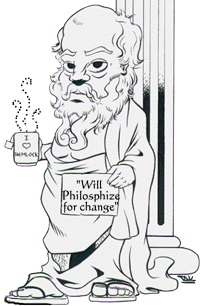IN DEFENSE
OF LIBERAL STUDIES IN THE UNIVERSITY, and
THINKING
CLEARLY ABOUT THE WISDOM OF SOCRATES
The pursuit of liberal
studies in our universities allows both professor and student to revisit
continually the realm of GREAT IDEAS AND THINGS BEAUTIFUL. To determine whether
or not this is a good thing, one has only to ask whether it is imaginable that
the goal of university professors should ever be to teach the mediocre and the
banal in their classrooms. This is a controversial “conversation,” however, which opposes the teaching of Great Books, Great Ideas & Things Beautiful at
the university, to the teaching of Issues, Skills & Trends of Our Day; and the
conversation is not new in this telling. England's Battle of the
Books in the 17th
Century (Jonathan Swift), which followed hard upon Enlightenment France's “Querelle
des Anciens et Modernes” (Boileau v. Perrault), is alive and well in its
American incarnation, and especially in university departments dedicated to
humanistic studies. The question, of course, is that if the Humanities do not
strive to speak on behalf of the Beautiful and Great, then who shall speak on
their behalf? Surely not the Scientists or the New World Philosophers (read: those
in the tradition of Analytical Philosophy). The university is more than a mill
to churn out diplomas. It is the institutionalized “place” whose goal is to guarantee
an ongoing dialogue between and with the traditions of excellence in ideas. So
in our university classrooms we must not allow ourselves to be diverted by
mediocre ideas (--yes, I have it on good authority that such things exist…).
In
addition to this rather straight-forward definition of classroom purpose for
liberal studies, I would also like to advance the idea that the ‘lesson of
Socrates’ teaches us that the wise man is neither the skilled man (the man with
skills) nor necessarily even the religious man, but the educated man who is
society’s gadfly, and whose life generally ends in the flurry of an unjust
condemnation and execution. Is it not rather short-sighted, then, that in our
world of cultural and value relativity, the philosophical teachers of liberal
studies continue blithely to hold up Socrates as a model of the good life,
which is to say the life lived in pursuit of the honorable? Is not, in fact,
the Socratic or philosophical life actually an embodiment of the High Tragicall
Life? Does not the original Socrates teach the same lesson as the ‘comic’
Socrates of Swift’s Gulliver tales when in the company of the Lilliputians
(Bloom, The Closing of the American Mind,
44-45), namely, that “civil society cannot endure … disproportionate greatness;
it must either submit itself to the one best man or ostracize him.”
These, then, are the two lines of thought that seem to
weave their way systematically through Liberal Studies programs -- ONE: The
controversy surrounding the study of “great books” in our universities, and
TWO: The consequences that follow when intellectuals believe, and teach their
students, that the Socratic life is a desirable model to follow in the creation
of our own lives. This has a bit of piquant in it, especially for professors of
philosophy, because our education and degrees have made of us (humanities
professors) the 'experts' in humanistic studies. So, if we should refuse to
take our designated seats as public spokesmen
for and advocates of liberal studies, then those seats will be occupied by
others infinitely less qualified and sensitive (from the other Arts & especially
the SCIENCES) to speak of the GREAT & the BEAUTIFUL; on the other hand, if
we should accept to follow both privately and publically the philosophical calling,
then are we not also, potentially, taking the first steps on the journey down
the road to Socrates’ cup of hemlock?
Socrates’ life:
Crito: the good life is chiefly to be valued – the good life is
equivalent to a just and honorable one.
Wisdom is not to know nothing, as is commonly thought and
commonly attributed to Socrates; rather,
human wisdom and knowing is of less import than the knowing of the gods
– Apology 20d/e, 21b, 23a* : “…it is likely that the god is really wise and by
his oracle means this: ‘Human wisdom is of little or no value.”’
Being unfairly put to death is the direct consequence of
Socrates measuring his limited human wisdom against other human egos.
Further Readings --
Battle of the
Books (Jonathan Swift);
Don Quixote (Miguel de Cervantes);
Female
Quixote (Charlotte
Lennox);
Madame Bovary (Gustave
Flaubert);
Fiction Is a Subject with a History – It Should be
Taught That Way (Flannery O’Connor);
Lolita (Vladimir Nabokov) – a sustained reflection on the
need for guided (to avoid mis-guided) contact with the world of ideas.

No comments:
Post a Comment